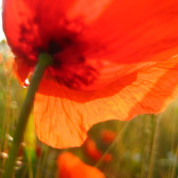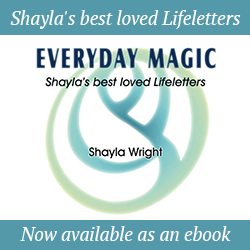
In over thirty five years of working with people, there is one question that is more challenging and disturbing than any other. A beautiful young woman said to me one morning, “When you ask me that question, I get so angry, I want to hang up this phone.” The question is very simple: “What do you really want?”
How can these five small words stir up so much turbulence in so many of us? Here is what I have discovered about this dilemma.
As we grow up, we receive very difficult and contradictory messages about desire, about our longing and yearning. The spiritual traditions have been ‘dissing’ desire for thousands of years, telling us to steer clear of it. Desire is the bad guy, the source of all the trouble we humans get into. If you have spiritual inclinations, you’re going to run up against this message. Chances are you already heard it from a parent, or a minister, from a rabbi or teacher. The strange thing is, no one really has any wisdom to share with you about how to deal with the energy of your desire. You are just told that it is dangerous, and needs to be shunned. So the living energy of desire gets stomped on, suppressed, put down and hidden away.
But here’s the thing about energy—it doesn’t disappear just because you don’t want it. It’s like putting a brick on top of a little sprout that just came up out of the ground. The life force in that little green sprout will just go on growing, but now sideways, and underground. Instead of leaping up towards the light, that little sprout gets twisted, distorted. That’s what happens to the life force that lives in our longing. We get rid of the longing, or if traces of it remain, we turn away from it. We believe we could never have what we really want. We tell ourselves to be practical, to be realistic. Or we feel that are not strong enough, good enough, worthy enough to receive what we are yearning for.
The other message we get is from our post-modern, materialistic, ‘god is dead’ culture. That message tells us that happiness lies in getting what we want. And what we want is stuff—a whole lot of it. So now the energy of desire gets wrapped around the urgency of this demand: “Give it to me now.” This is an immature form of desire, almost infantile. It leads to a lot of suffering and frustration.
These two messages and belief structures look so different, but in both cases, this longing, this yearning, is experienced as painful. I have to get rid of it somehow, either by smothering it or by madly pursuing it. What I never consider is a new, adult relationship with desire. It doesn’t occur to me that desire has its own intelligence, and that if I open up to its energy, if I make direct contact with it, something beautiful could emerge. This new direction is the road not taken, the door that is not opened.
Desire is painful because we have deep unfulfilled needs still living in our nervous systems. When we are young, we need someone to hold us in their loving presence, and to recognize who we really are. We need them to be fully present for all of our feelings, so that we learn, very early on, to feel, and not to suppress. We need someone to hold this loving space for us, so that we are free to explore, experiment, and let our energy flow freely. This is how we grow and develop and discover our creative, courageous, intelligent nature. It happens when we look in the mirror of another person and know that we are seen, heard and felt.
During a training I was part of last year, with a group of almost one hundred people, we were exploring our own early experiences in this context. One day our facilitator asked us a question. He invited anyone who had actually received this kind of loving presence when they were young to speak up. I remember sitting there, waiting, knowing that it wouldn’t be me. And there was only silence. Nobody said a word. Not one person in that group of intelligent, educated human beings had received that kind of nourishment from their early caregivers.
That was a turning point for me. I realized that this longing that lives in us is cultural and ancestral. I saw that we all carry inside us this deep yearning for what was not given. Not given because our parents did not receive it either. No one is to blame. We stand in a long lineage of disconnection, of estrangement. If our parents see us as objects, they stand apart from us, and look at us with their minds. How can they perceive or feel the beauty of our essence, of the soul, of our true nature? And what is not recognized in us goes underground. We lose our own connection with the truth of who we are.
This longing to be seen and heard speaks to us of this rupture, this profound disconnect, and we are afraid to face it. Because it’s too late now for us to ask our parents to hold us, to see us, to feel us. And we don’t know what else to do. So we hide it, and try to be grown up and strong. It’s a noble effort we all make. Even if everything goes sideways, we did the best thing we knew how to do, to protect and care for ourselves. When we were on our own, in all that pain and confusion.
We don’t want anyone else to know how lost we feel, how lonely, how frightened, how full of sorrow and anger. We don’t want to come across in our relationships as this needy, pathetic person. So of course we hide it. And a lot of the time, we ourselves don’t want to touch this longing. A woman who was participating in a group I was facilitating this week had an experience of making deep and true contact with someone else in the group. “I feel like I was starving for this and I didn’t even know it,” she said.
…what we want appears
in dreams, wearing disguises.
We don’t remember the dream,
but the dream remembers us.
It is there all day
as an animal is there
under the table,
as the stars are there
even in full sun.
~ Linda Pastan
And when this desire to be seen and heard and felt, which is like the mother of all our longing, gets cut off from the light of awareness, we fall for the substitutes. All the things that might fill up the emptiness inside. We don’t really grow up. We just try to behave like a grown up, especially in public. Real maturing happens naturally, when we receive what we really need. Then we grow tall, like a bright tree, and open to another kind of desire, which is about giving, loving, participating fully in life. About becoming fully ourselves, letting the beautiful gifts that live in us flow out into the world. About discovering the truth of who we are—the truth of our humanness and the truth of our living presence.
Here is the good news—something is changing in our culture, in our world at this time. People are waking up to a new possibility. The word is out. You can hear conversations everywhere about the need for real connection, for intimacy, for vulnerability. More and more people are ready to walk through that door, into brand new territory. We are willing to learn how to hold our own yearning, our deep longing, in the space of the loving presence that is always here.
But not alone. With good company, with real, genuine support. Which is available, when we are ready.
“Everything is ready when one is ready. Nothing is
ready when one is not ready.”
– Hau Hu Ching
with love
Shayla
4 Comments
Join the conversation and post a comment.


Recently, I heard of a theory that we’re collectively suffering from a kind of post traumatic stress disorder that keeps us on a path that’s suicidal. Your lifeletter brought this to mind. Thanks, Shayla, and take care.
Diana
Shayla, this is a beautiful essay on desire and longing, which I’ve been considering deeply these days, both my relationship to it and how it appears in my clients. I love the metaphor of the seedling and stone. Thank you for sharing your insights deeply from your heart and with such nuance.
Miss you friend.
Holly
Shayla, how true and beautifully said. I so enjoyed your wonderful presence at the Non-dual Psychology Meetings in Lethbridge last week. Thankyou…
Elizabeth
It is so exciting to be part of something so profound! To break the cycle of disconnect is to create a new foundation for a new future. This is why I am so thrilled to be alive right now. Twenty years ago a perfect stranger saw me, she loved me so thoroughly because she needed to love someone and I needed to be loved in that way. Now, with that experience, I can do the same.